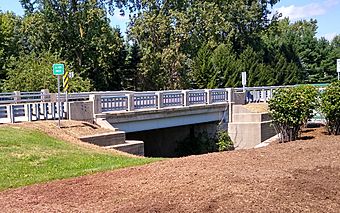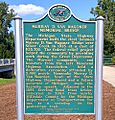Murray D. Van Wagoner Memorial Bridge facts for kids
Quick facts for kids |
|
|
Murray D. Van Wagoner Memorial Bridge
|
|

The Murray D. Van Wagoner Memorial Bridge carrying M-156 over Silver Creek in Morenci, Michigan.
|
|
| Location | M-156 over Silver Creek, Morenci, Michigan |
|---|---|
| Area | less than one acre |
| Built | 1935 |
| Built by | W.H. Knapp Company; Michigan State Highway Department |
| Architectural style | Steel I-beam stringer |
| MPS | Highway Bridges of Michigan MPS |
| NRHP reference No. | 99001731 |
| Added to NRHP | January 27, 2000 |
The Murray D. Van Wagoner Memorial Bridge is a special bridge that carries a road called M-156 over Silver Creek in a town called Morenci, Michigan. This bridge was added to a list of important historical places, called the National Register of Historic Places, in the year 2000. It's named after Murray D. Van Wagoner, who was an important person in Michigan's history.
Contents
Discovering the Bridge's Past
The town of Morenci, where this bridge is located, was founded in 1852. It became an important place for factories and grain mills. Before the current bridge, there was an older bridge at this exact spot. This older bridge was about 40 feet (12 m) long.
By the early 1930s, the old bridge was in very bad shape. In 1935, the state of Michigan decided to work with a group called the Taft Memorial Highway Association. This group had started in 1930 to create a special highway. This highway would stretch all the way from Florida to Michigan. It was built to honor William Howard Taft, who was a former U.S. President. Part of this big project included replacing the old, worn-out bridge in Morenci.
Building the New Bridge
The state of Michigan hired a company from Monroe called W.H. Knapp Company to build the new bridge. The cost to build it was $35,700 in 1935. The bridge was officially opened on July 31, 1935. A special speech was given by Murray Van Wagoner at the dedication. The city council decided to name the bridge after him.
Murray Van Wagoner was a very important person in Michigan. He was the head of the Michigan State Highway Department from 1933 until 1940. After that, he was elected to be the governor of Michigan.
Recent Updates to the Bridge
The bridge was repaired and updated in the year 2000. A few years later, in 2004, another old bridge was moved nearby. This other bridge, built in 1893, is now used for people walking or biking on a trail.
What the Bridge Looks Like
The Murray D. Van Wagoner Memorial Bridge is about 45 feet (14 m) long. It has a wide top surface, called a deck, that is about 41.4 feet (12.6 m) across. The part of the deck where cars drive, called the roadway, is about 33 feet (10 m) wide. On both sides of the roadway, there are sidewalks for people to walk on.
The edges of the bridge deck have railings. These railings are made of strong concrete posts. Between these posts, there are decorative metal sections that look like a fancy pattern. The parts of the bridge that connect to the ground, called the substructure, are made of concrete. These concrete parts have a decorative stepped design.
Gallery





